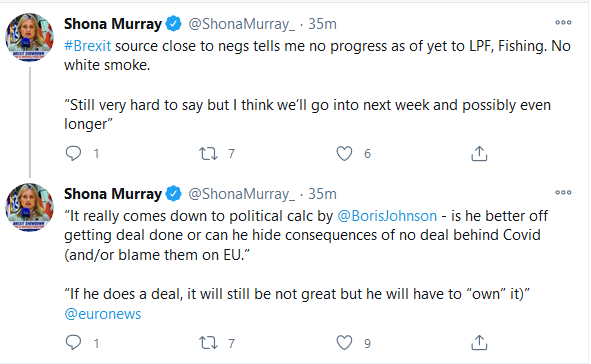
So still no progress, no walking away, and no agreement too late apparently for implementation on January 1.
A complete mess.
A complete mess.
https://twitter.com/MichelBarnier/status/1332240787350958080
"Next week" has been the key week for Brexit talks for several weeks now.
If there was an agreement struck towards the end of next week there would be <20 working days for legal scrub, translation, discussion, ratification, implementation.
If there was an agreement struck towards the end of next week there would be <20 working days for legal scrub, translation, discussion, ratification, implementation.
https://twitter.com/lisaocarroll/status/1332239297815179265
Still this @ShonaMurray_ and it looks like the EU are happy to facilitate UK indecision such that both sides can be blamed by business with insufficient time to prepare. 

Honestly if governments are exasperated about the state of UK-EU talks they should try talking to those who will be directly affected on January 1.
https://twitter.com/adamparsons/status/1332235170909392898
Interesting article. So which is the EU priority? By some distance resolving the internal budget / rule of law issue.
https://twitter.com/Mij_Europe/status/1332225172481470464
As I wrote yesterday, no deal means an ongoing saga since the next target will be the Withdrawal Agreement. But a deal will not override the Northern Ireland protocol. Very difficult politics ahead. politico.eu/article/uks-tr…
The PM breaking with the ERG and going for an EU deal would go a long way to finally putting the UK on a path back to normality. Otherwise in more ways than one we will be a country to avoid. Bluntly that's what is now at stake.
https://twitter.com/JP_Biz/status/1332248008336023555
While Brexiteer fantasies like this (claiming the economics followed by every developed country is wrong) or absolute regulatory sovereignty is anywhere near government policy we can't move on. Simple enough. briefingsforbritain.co.uk/myths-about-th…
Incidentally for those who think that mysteriously UK or EU positions would change after January 1, and a short period of no-deal would be followed by living happily ever after.
Don't see why. The blame game will be fierce.
Don't see why. The blame game will be fierce.
So puzzle fans, solve this. Michel says Boris should move and Boris says Michel should move. But even if Boris moves he will say it was Michel that moved. However Michel will need to say Boris moved. 

Riddle me this. How do you reconcile this definition of sovereignty with the international commitments that we already have, such as our membership of the WTO, which restrict our state aid regime, or the Northern Ireland Protocol regarding our borders?
https://twitter.com/DavidGHFrost/status/1332291822442467329
So the EU fisheries meeting was significant. Looks to me like blame avoidance - ok UK we have now offered a compromise on every one of the major concerns you claimed initially. What have you done?
https://twitter.com/tconnellyRTE/status/1332296730193371136
EU talking substance but unwilling to change philosophy (trade deals have conditionality). UK talking philosophy (we don't think trade deals should have conditionality). Trying to put pressure on the UK to decide / agree the philosophy. Back to that big question.
The substance remains the least important part of the UK-EU talks. Which is why an EU move on fish is so interesting. High symbolism. Is there to be a UK response?
https://twitter.com/heanley_rob/status/1332302326653198341
On the detail fishmeister @john_lichfield has spoken. So does this now give the UK side the space to move? If it doesn't, game over for a deal right at the moment.
https://twitter.com/john_lichfield/status/1332310207427469313
Grab your seatbelts folks, if this is the formal UK reaction I think we're done (the response, that's derisory but at least they started would mean deal)
https://twitter.com/Barnes_Joe/status/1332305893216620545
• • •
Missing some Tweet in this thread? You can try to
force a refresh



